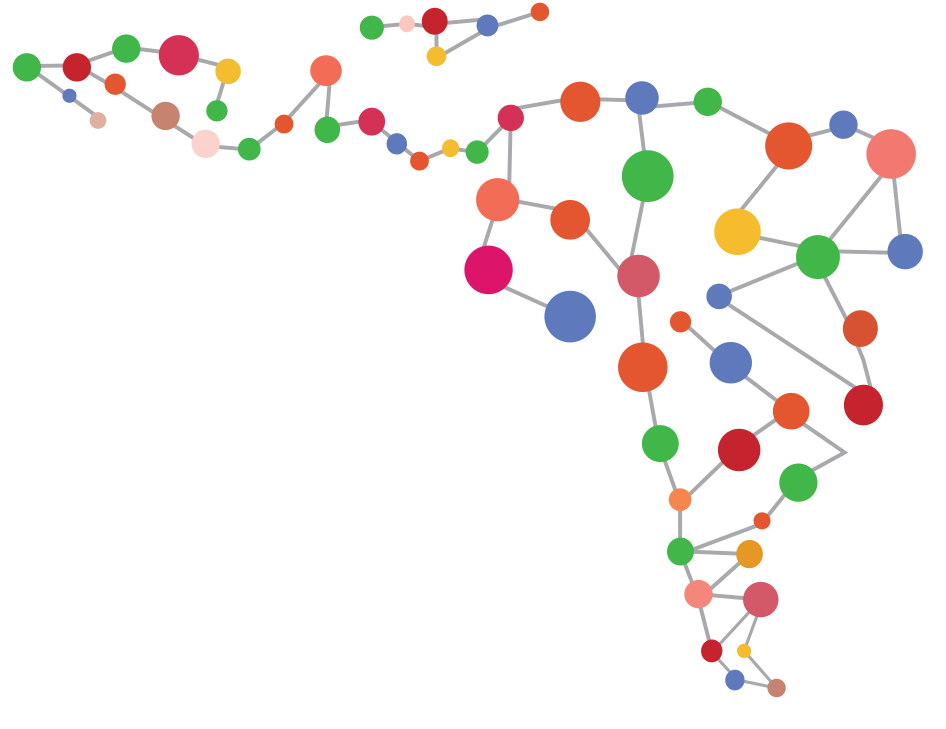Authorities Recognize and Highlight the Role of the State in the Post-Pandemic Recovery and Urge for Building Resilient Institutions to Confront Development Challenges
Work area(s)
The Eighteenth Meeting of the Regional Council for Planning of ILPES was inaugurated today.

Ministers, deputy ministers and high-level authorities from Latin American and Caribbean countries recognized and highlighted the role of the State for leading post-pandemic recovery processes and urged for building resilient institutions, with renewed capacities, to tackle increasingly complex development challenges, during the inauguration of the Eighteenth Meeting of the Regional Council for Planning (RCP) of the Latin American and Caribbean Institute for Economic and Social Planning (ILPES), which is taking place through October 21.
The event – which is being held using a hybrid format, meaning virtual and in person – was inaugurated by Isaac Alfie, Director of the Office of Planning and Budget (OPP) of Uruguay, in his capacity as Chair of the Regional Council for Planning of ILPES; Héctor Alexander, Minister of Economy and Finance of Panama; Cristian Munduate, United Nations Resident Coordinator in Panama; and Alicia Bárcena, Executive Secretary of the Economic Commission for Latin America and the Caribbean (ECLAC).
“The Regional Council for Planning must remain an active forum for discussing the challenges for a post-COVID-19 recovery, the necessary integrality and coherence of public policies aimed at socially and environmentally sustainable economic growth without losing sight of equity,” stated Isaac Alfie, Director of Uruguay’s Office of Planning and Budget.
Meanwhile, Héctor Alexander, Minister of Economy and Finance of Panama, emphasized that the Eighteenth Meeting of the Regional Council for Planning “will be a momentous gathering, since we will make significant progress on the perspective of planning that is useful and necessary for building our countries and our region.”
Cristian Munduate, United Nations Resident Coordinator in Panama, stressed that both ECLAC and ILPES will serve as a critical technical support for the UN System’s country team in Panama for moving towards the goals that have been set.
In her opening remarks, Alicia Bárcena, ECLAC’s Executive Secretary, affirmed that even though countries are still in the midst of the pandemic, with vaccination schemes that are advancing very asymmetrically, it is necessary to rise above the current juncture and build in a participatory way probable future scenarios that contemplate a development pattern with greater equality and sustainability and that have, as an enabling condition, the rebuilding of trust in institutions so as to strengthen democracy.
“The transformative recovery proposed by ECLAC requires an institutional framework that is more resilient, with renewed capacities for interpreting and working in complex contexts with high levels of uncertainty, and with the ability not only to anticipate, prepare for and respond to crises, but also to forge and bring into being projects for the future, proactively watch over the present and reflect on the past, learning from experiences and making the necessary transformations possible,” she emphasized.
The senior United Nations official also underlined that the State’s capacity to rebuild trust is a central element for negotiating private interests in pursuit of the common good, reformulating power relations in the territory, and reaching the agreements and compacts needed to foster a new development model that would ensure a decent life for all.
After the inauguration, Alicia Bárcena presented a position paper entitled Resilient institutions for a transformative post-pandemic recovery in Latin America and the Caribbean: Inputs for discussion. This document contends that in order to confront the structural problems of the reigning development pattern and address the new challenges posed by the current crisis and those to come, we will need strengthened state institutions that have renewed capacities and leaderships for designing and implementing – in a participatory, collaborative and inclusive way – policies and programs that meet the needs of the present, with a view to the future.
“This document is a proposal for building resilient institutions to endow ourselves with greater capacities for a transformative recovery and help us move towards a development model that is more sustainable and has equality at the center. This requires improving prospective capabilities, capacities for dialogue, openness, participation and negotiation, and for planning in order to integrate cross-cutting approaches and new leaderships,” Alicia Bárcena stated.
The position paper indicates that the COVID-19 pandemic surprised the region, which had few tools for addressing the complexity of the crisis, and links this to structural lags. In this context, the irreplaceable role of the State for representing the public interest on all territorial scales became evident.
The document stresses that participation and access to information strengthen trust in the decisions made by the State. It specifies that as of 2021, of the 33 countries in Latin America and the Caribbean, 23 (70%) have adopted laws on access to public information, 8 (24%) have passed laws on public participation, 24 (73%) have signed the Regional Agreement on Access to Information, Public Participation and Justice in Environmental Matters in Latin America and the Caribbean (the Escazú Agreement), and 12 countries (36%) have ratified it.
It also reinforces the eight strategic sectors proposed by ECLAC that can bolster investment and growth and reduce socioeconomic and gender inequalities. These are the transition towards renewable energies; sustainable electromobility in cities; an inclusive digital revolution; the health care manufacturing industry; the bioeconomy; the circular economy; sustainable tourism; and the care economy.
The position paper stresses the importance of moving towards an open State and consolidating e-government, which enables accessing information and services, bringing public administration closer to citizens, and promoting collaboration among state institutions.
Furthermore, it calls for integrating a gender perspective into planning as a crucial aspect for mainstreaming gender equality in all areas of public administration. It specifies that 70.4% of the region’s countries have fewer than 6 objectives linked to SDG 5 on Gender Equality and Women’s Empowerment, while only 7.4% have more than 10 associated objectives.
The document also notes the urgency of strengthening national public investment systems for a transformative recovery with a territorial and local perspective, and it emphasizes that climate change mitigation and adaptation is carried out in specific places and require planning for tackling future crises.
During the first day of this meeting, the region’s authorities ratified the new Presiding Officers of the Regional Council for Planning, which will stay in effect for the next two years and is composed of Panama as Chair, along with Dominica, the Dominican Republic, Ecuador, Guatemala, Jamaica and Paraguay. They are joined by Chile, which is a member of the Council in its capacity as the country where ILPES and ECLAC are headquartered.
Related event
Eighteenth meeting of the Regional Council for Planning of ILPES
Reunión virtual - El Consejo Regional de Planificación (CRP) es el órgano subsidiario intergubernamental de orientación de las actividades del Instituto Latinoamericano y del Caribe de Planificación…
Related content
Inauguración de la XVIII Reunión del Consejo Regional de Planificación del ILPES
Palabras de Alicia Bárcena, Secretaria Ejecutiva de la CEPAL.
Instituciones resilientes para una recuperación transformadora post pandemia en América Latina y el Caribe: Aportes para la discusión
Presentación de Alicia Bárcena, en la XVIII Reunión del Consejo Regional de Planificación del ILPES.
Related link(s)
Country(ies)
- Latin America and the Caribbean
Contact
Public Information Unit
- prensa@cepal.org
- (56 2) 2210 2040

